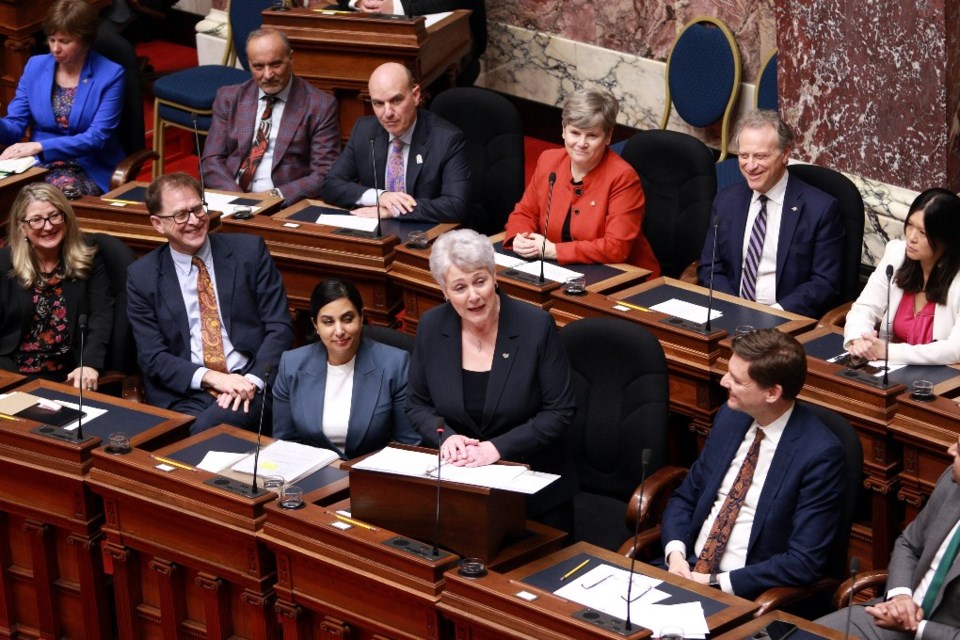Families and small business operators in B.C. are expected to benefit in an election-year budget that boosts spending, but forecasts a deficit of more than $7.9 billion and economic growth of less than one per cent.
The budget pledges to introduce a home-flipping tax to deter real estate speculators and a commitment to provide one cycle of free in-vitro fertilization to anyone who wants to start a family, Finance Minister Katrine Conroy said Thursday.
B.C. is an economic leader in Canada but a slowing economy and increasing housing and grocery costs mean people needed help, she said.
“At the end of the day, people have a lot on their minds right now and they’re feeling stretched,” Conroy said in her budget speech to the legislature.
She said the New Democrat government would not resort to making cuts.
“This would only weaken the services we all rely on and drive up costs with added fees and fares,” Conroy said. “It would leave people at risk to those who take unfair advantage by putting profits ahead of people.”
The budget includes a one-year boost to the B.C. Family Benefit, giving eligible low- and middle-income families an extra $445 over a year on average, as well as a one-time electricity credit that will save households an average $100, she said. The electricity credits will appear on customer bills starting in April and run to March 2025.
Conroy said the home-flipping tax, to be introduced this spring, will fund the construction of housing for middle-income earners.
“To those who just want to make a quick buck by flipping homes, things are about to get more difficult,” she said.
“If a home is sold within two years of purchase, the profit will be taxed.”
The budget forecasts slowing economic growth of 0.8 per cent this year, followed by growth of 2.3 per cent in 2025. B.C.’s debt is forecast to increase to $123 billion this year, up from $103.7 billion.
The budget included funding for previously announced projects on Vancouver Island, many of which saw cost increases from their original announcements. The province allocated $54 million, up from $46.5 million, for a seismic replacement of Cedar Hill Middle School with capacity for 575 students. Scheduled for occupancy in 2025, the school will include an Indigenous space and low-carbon design features.
The budget has $49 million, up from $39.6 million, for a new school in Langford. South Langford Elementary will have space for 480 students and is slated for opening in 2025.
Two new buildings with 217 beds are coming to North Island College in 2025 at a price tag of $78 million, while a seven-storey student housing and dining building with 266 beds at Vancouver Island University is expected to be complete in 2026.
A new child-care space at North Island College is planned at a cost of $15 million. It will provide 75 spaces in a region the province says has a high demand for child care and will include spaces for infant and toddler care, school age care and care for kids who need extra support. The project is anticipated to be complete in 2025.
An additional $23 million over three years to services contracted with B.C. Ferries will address the rising cost of fuel and mechanical maintenance for contractors who operate ferry services on unregulated routes, as well as fare discounts for students, seniors and those travelling for medical purposes.
Post-secondary institution spending is projected to increase by $845 million, from $8.39 billion in 2023-2024 to $9.23 billion by 2026-2027. The increase is mostly due to staffing demands to meet a growing student base, the province says.
Last year, a group of post-secondary unions urged the province to increase funding to universities and colleges to offset budget cuts that resulted in job losses. The University of Victoria announced a $13-million budget cut this month, citing declining revenue as international enrolment continues to drop.
A UVic spokesperson said it was too early to say how the new budget might impact the university.
BC United Opposition Leader Kevin Falcon called the budget presented Thursday a “foolish” use of taxpayers’ money.
“This is a reckless, inflationary budget that’s going to make things more unaffordable for families,” he said after Conroy’s speech. “When government is spending this recklessly, it drives inflationary pressures, which impacts groceries, it impacts housing, it impacts everything that is already affecting British Columbians.”
Falcon said the ballooning debt would be handed down to future generations and the province’s credit rating was in danger of downgrades due to the spending.
He said young people are being driven out of the province because of spiralling living costs.
“We are seeing young people in the prime of their working lives fleeing British Columbia for Alberta, for Ontario, for almost anywhere but British Columbia, because they’re tired of living in an NDP world,” he said.
“We’ve become the most unaffordable, expensive jurisdiction in the entire country, and I think that’s very sad and tragic for families.”
Green Party Leader Sonia Furstenau said the NDP missed an opportunity to help people who are struggling during difficult times.
“At a time when we needed bold investments in the people and the future of this province, we got a government that found a way to spend $89 billion and achieve status quo,” she said. “It’s an astonishing feat, actually.”
B.C. voters are set to go the polls in October.
>>> To comment on this article, write a letter to the editor: [email protected]
This report by The Canadian Press was first published Feb. 22, 2024






